
MUSKOGEE, Okla. – Aluminum isn’t just for soda cans, airplanes and kitchen foil. It’s also a quite suitable material from which to build a bass boat.
While most of the Bass Pro Shops Central Open field hit the water on Day One in standard fiberglass water rockets, a pair of anglers opted for a more low-tech approach to the Arkansas River, fishing from aluminum boats that enabled them to reach less-pressured backwater areas – and the top spots on the tournament leaderboard.
Tommy Biffle from Wagoner, Okla., which is just up the road from the tournament site, used an aluminum Triton with a jet-drive Mercury motor to find a productive backwater area that produced an 18-pound, 12-ounce limit, far and away the best bag of Thursday’s competition.
“In this tournament, there’s no off-limits, and these guys have been practicing for two weeks,” Biffle explained. “Any place you can put a regular boat has been beat up. So I thought about getting an aluminum boat and going where they can’t go.”
Janet Parker of Texas reached a similar decision during practice and found similar results. Parker caught 15-2, Day One’s second-best stringer, fishing from an aluminum Legend with an Evinrude jet-drive motor.
“I’ve been here a week practicing and I had a pattern in a couple of the pools I’d been fishing,” Parker said. “But the amount of pressure those fish were getting made me nervous, so I decided to get into some water that’s not accessible with a conventional motor. I just figured those fish haven’t seen as many lures.”
The fiberglass bass boat is ubiquitous on lakes and rivers across the country. The highly specialized machines are used almost exclusively in national, regional and local bass tournaments. But Biffle and Parker reinforced what many serious but cash-strapped anglers have known for years – aluminum boats are a fine fishing platform.
The aluminum boat’s biggest advantage is weight. They draw less water and allow anglers to pass through shallow areas that heavier fiberglass boats can’t reach.
Biffle and Parker also are using jet-drive motors on their rigs. Water enters and exits a jet drive at differing velocities, power is converted to thrust through an impeller, and the thrust propels the boat (it’s basically the same system that makes a Jacuzzi work).
For safety reasons, jet drives are standard equipment on personal watercraft; no propeller means less chance of injury when a rider falls off the watercraft. But jets also offer advantages for fishing boats: the jet doesn’t extend as far into the water as a propulsion system that uses a propeller, meaning there’s less motor in the water to hit submerged objects.
The jet system was crucial for Biffle and Parker on Day One. Both accessed their areas by motoring over rocks and shoals in less than six inches of water.
“I just got the boat up on pad and scooted right over it,” Parker said.
Biffle borrowed the boats he’s using, a camouflage rig that looks more like a duck hunting machine, from a friend in Muskogee. Parker, who’s fishing the Bassmaster Open circuit with hopes of becoming the first female angler to qualify for the Bassmaster Elite Series, had to go a little farther to find her boat.
“I called Ranger Boats and asked them if they knew of any jet-drive boats that were available,” she said. “They were kind enough to make some calls for me and found one.”
Parker drove to Cow Town USA, a boat dealer in Cuba, Mo., to pick up the loaner boat.
“It was like 11 hours round trip,” she said. “But it was well worth it.”
Although Biffle, Parker and a handful of other anglers are using aluminum boats this week, their rigs aren’t standard flat-bottom johnboats. They’re equipped with casting decks, storage compartments, big trolling motors and big outboards. They’re basically smaller, lighter versions of the fiberglass boats their competitors are using on the Arkansas River.
Based on Thursday’s results, however, the aluminum contingent appears to have an early advantage.
“This tournament’s going to be won in an aluminum boat,” said Elite Series pro Jeff Kreit, who finished Day One in 35th place with 8-4. “I’d rent one if someone would let me borrow it.”
